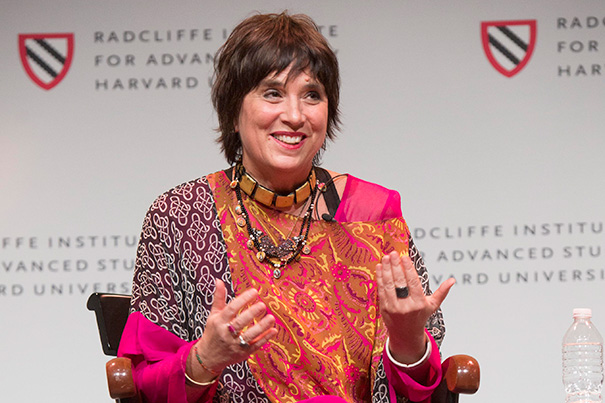
Eve Ensler shared her story during the opening of the Radcliffe conference “Who Decides? Gender, Medicine, and the Public’s Health.”
Photo by Tony Rinaldo
Eve Ensler’s personal monologue
Author opens Radcliffe’s gender and medicine conference with her own story
Author and activist Eve Ensler read at Harvard’s Radcliffe Institute from her new memoir, “In the Body of the World,” and encouraged audience members to “live in the moment” and “always be present” in their bodies, lives, work, and relationships.
Her presentation about her fight with cancer and her work in the Congo elicited laughter, tears, outrage, despair, and hope in — and a standing ovation from — the shoulder-to-shoulder crowd.
Ensler opened the two-day (April 10-11) conference “Who Decides? Gender, Medicine, and the Public’s Health,” which brought together physicians, policymakers, journalists, and academics to examine topics such as how we care for our health and respond to disease. “To understand any health program today, we must have a biosocial view. A view that sees big forces — history, culture, political economy — coming right into the physiology of the person, into the meanings of the groups, into the responses of the institutions,” said Harvard Medical School’s Arthur Kleinman.
Rep. Louise M. Slaughter, D-N.Y., said that progress has been made in improving women’s health through steps such as securing funding for National Institutes of Health research on women’s diseases and the Violence Against Women Act. Slaughter also noted that “women’s health has come a long way in a short period of time, and as more women assume positions of leadership and power and work to enact positive change, the pace of progress will only quicken.”
One of the more shocking revelations for the audience came during the afternoon panel on funding and analysis of health research. Author and journalist Peggy Orenstein discussed the politics of breast cancer and the complexities of early screening and detection. “Disease and risk is as much of a social construct as it is a medical construct, and sometimes public perceptions and beliefs trump actual fact,” she said. But it was the data on heart disease shared by C. Noel Bairey Merz, M.D. ’81, of Cedars-Sinai Medical Center in California, that shook the audience: “Heart disease kills 10 times more women in the United States every year than breast cancer. We spend 10 times more money on breast cancer research than on heart disease research in women,” she said. “As we talk about public health issues, heart disease is really the epidemic now. The silent epidemic that needs to not be so silent as we talk about public health.”
To learn more about the topics and conference, visit the Radcliffe Institute website.





